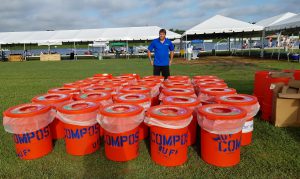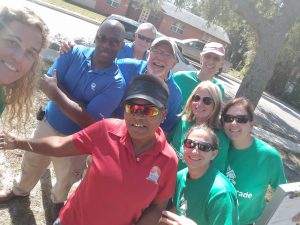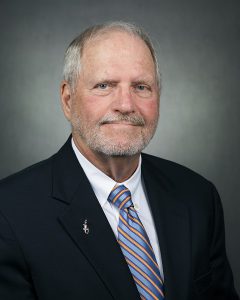The Sarasota you love is changing. Residents arriving. Concern about red tide and water quality rising. Green space shrinking. A heavier lift for the low-income to make it in the new Sarasota.
You’re at a quality-of-life crossroads. The science of sustainability can’t choose your path for you, but it can help you make sense of your options. The University of Florida’s mission as your land-grant university is to deliver that science to your community.
A team of science ambassadors operates out of a satellite office in Twin Lakes Park on Clark Road, across the parking lot from a Baltimore Orioles training facility. The UF Institute of Food and Agricultural Sciences (UF/IFAS) Sarasota County Extension team is unlike any of the other 66 offices in Florida.

The throngs of international visitors at rowing competitions at Nathan Benderson Park discard trash and half-eaten meals like anyone else. Penn organized composting volunteers who diverted 2,500 pounds food waste from the trash to composting bins last year.
In the long term, Penn is working with the UF College of Health and Human Performance to develop an environmental curriculum for the sports management master’s degree program to train future professionals how to make large sporting events into small polluters.
There are fewer homes being tented for termites in Sarasota because of the expertise of the state’s only local chemicals-in-the-environment agent. Carol Wyatt-Evens helped identify some of the first local cases of the Formosan subterranean termites.
Early detection leads to coordinated responses that so far have prevented the kind of swarming that in other cities can be seen from outer space. A pest control operator has relied on identifications from Wyatt-Evens to use an alternative to tenting on multiple homes.
Residents get “energy coaching” from Extension-trained volunteers who can help them save big money on their utility bills without spending big money to do so.

The problem? A broken thermostat that kept the home at an energy-chugging 60 degrees. Extension helped the resident get it repaired and recommended new air filters and energy-efficient bulbs.
The coaches make house calls to low-income homes to share energy hacks, and they’ve partnered with a local utility for before-and-after monthly usage to see if the coaching is helping. Early results are positive.
At the County Commission’s request, Sarasota County Extension helped coordinate a report on what is being done about red tide — and what could be done. Extension agents and volunteers have taught Florida-Friendly Landscaping™ principles to packed houses as well as to Plant Clinic visitors seeking to take personal action. They are teaching landscaping professionals how to get the job done with fewer fertilizers, herbicides and pesticides.
If these were easy issues, they would have been solved already. Fortunately for Sarasota, its Extension office has more staff with doctorate degrees than any other in Florida. They now put the creativity and passion they used in earning those degrees into addressing your community’s challenges.
Sarasota County Extension still runs classic programming, like 4-H and Master Gardeners, and a sustainable agriculture agent will work with local ranchers and farmers.
Extension leads by example, too. When it opened in 2006, the office was certified as the greenest building in the state at the time. To this day it funnels rainwater into a 28,000-gallon cistern that supplies the water to flush the building’s toilets. As one of the first buildings to use this technology, it was obligated to post over the toilets a warning to all those Ph.Ds. not to drink the water! The Extension site also has solar panels and demonstrations of Florida-Friendly Landscaping™ and composting strategies.
So please call, email or visit. You can find out about upcoming events or ask questions by visiting sfyl.ifas.ufl.edu/sarasota, calling 941-861-5000, or emailing sarasota@ifas.ufl.edu.
The object is to help keep the things about Sarasota you love, while making it possible for more people to enjoy it. And to put university science and outreach on sustainable living into the service of building a house-by-house ethic of keeping Sarasota clean and beautiful.
 Jack Payne is the University of Florida’s senior vice president for agriculture and natural resources and leader of the Institute of Food and Agricultural Sciences. Email: jackpayne@ufl.edu; Twitter: @JackPayneIFAS
Jack Payne is the University of Florida’s senior vice president for agriculture and natural resources and leader of the Institute of Food and Agricultural Sciences. Email: jackpayne@ufl.edu; Twitter: @JackPayneIFAS
 0
0
